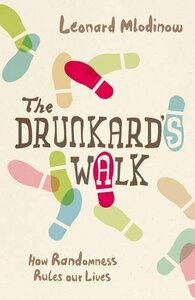Take a photo of a barcode or cover
This was hit or miss, but more hits than misses. You could even call it random...
I will re-read this to catch what I missed the first time. And recommend it to my nerd friends.
I will re-read this to catch what I missed the first time. And recommend it to my nerd friends.
Very interesting book. It shows how the filed of probabilities and statistics has been considered historically and how random events caused it to evolve. The author also present common fallacies and their influence on our human lives.
Algus oli minu jaoks igav ja veniv, aga läks huvitavamaks! Ei saa öelda, et midagi väga uut või elumuutvat siit tulnud oleks, aga paneb mõtlema igasugu kognitiivsetele vigadele, mida igapäevaselt teeme, ning natuke ajalooülevaadet ei tee ka paha :)
informative
reflective
medium-paced
Some interesting and practical ideas, but a lot of it is a bit repetitive of high school pre-calc, at least where the math is concerned.
I think this book is a must-read for any person who considers themselves an informed citizen: it reveals the misunderstanding of probability and statistics that a majority of the population has and will enable you to determine the true significance of polls, surveys, and statistics thrown out in current events.
Very interesting. Best overview of probability, chance and practical use of the mathematical theories I've read. Told in a relatable, interesting manner. It just kind of snuck up on me that I'm reading about math.
Mlodinov has tried in this book «to present the basic concepts of randomness, to illustrate how they apply to human affairs, and to present his views that its effects are largely overlooked in our interpretations of events and in our expectations and decisions. It may come as an epiphany merely to recognize the ubiquitous role of random processes in our lives; the true power of the theory of random processes, however, lies in the fact that once we understand the nature of random processes, we can alter the way we perceive the events that happen around us».
So this book is about probability and statistics. «No other branch of mathematics is so easy for experts to blunder as probability theory», said Martin Gardner.
It is about the principles that govern chance, the development of these ideas and the manner in which they play out in several areas of human affairs. And it is also about the way we make choices and the processes that lead us to make mistaken judgements and poor decisions when confronted with randomness.
We associate randomness with disorder, yet although the lives of 200 million drivers vary unforeseeably, in the aggreagate their behavior could hardly have proved more orderly. And analogous regularities can be found if we examine how people vote or buy stocks and if we measure the length of their legs or the size of their feet. Moreover, social data often follow the normal distribution. And events whose patterns appear to have a definite cause may actually be the product of chance.
There is a fundamental clash between our need to feel we are in control and our ability to recognize randomness. When we assess the world, we tend to see what we expect to see. People systematically fail to see the role of chance in the success of ventures and in the success of people, and we unreasonably believe that the mistakes of the past must be consequences of ignorance or incompetence and could have been remedied by futher study and improved insight.
To swim against human intuition is a difficult task, but people's intuition about randomness fails them in many situations. Besides, the connection between actions and results is not as direct as we might like to believe. We usually underestimate the effects of randomness. Extraordinary events can happen without extraordinary causes, even random events often look like non-random events.
In complex systems (among which the author counts our lives) we should expect that minor factors we can usually ignore will by chance sometimes cause major incidents.
Mlodinov deals with interesting topics like these: Hollywood (success or not in films), sports (the hot-hand fallacy), Roman law (which fell short of mathematical vadility mantaining that two half proofs constituted a complete proof) and modern law (use of probability and statistics in court), the Monty Hall problem, Benford's law, the law of large numbers, bayesian statistics (with many applications, for example the use of drugs in medinice), politics, elections, Brownian motion (from there the title, The Drunkard's Walk), the confirmation bias, the butterfly effect, etc.
And he brings us the lives and works of several well known characters as Cicero, Cardano (his The Book on Games of Chance represents the first success in the human quest to understand the nature of uncertainty), Blaise Pascal (his famous triangle or the so known Pascal's wage to prove the existence of God), Galton or Michael Faraday (yes, one of the founders of electromagnetic theory did research in spiritual contact).
I enjoyed this book very much. It is well written, with an agile and entertaining style. It deals with many topics, it doesn't delve into any of them but it explains them fairly. It's a complete look in the history of probability and statistics as well as a great summary of its applications.
So this book is about probability and statistics. «No other branch of mathematics is so easy for experts to blunder as probability theory», said Martin Gardner.
It is about the principles that govern chance, the development of these ideas and the manner in which they play out in several areas of human affairs. And it is also about the way we make choices and the processes that lead us to make mistaken judgements and poor decisions when confronted with randomness.
We associate randomness with disorder, yet although the lives of 200 million drivers vary unforeseeably, in the aggreagate their behavior could hardly have proved more orderly. And analogous regularities can be found if we examine how people vote or buy stocks and if we measure the length of their legs or the size of their feet. Moreover, social data often follow the normal distribution. And events whose patterns appear to have a definite cause may actually be the product of chance.
There is a fundamental clash between our need to feel we are in control and our ability to recognize randomness. When we assess the world, we tend to see what we expect to see. People systematically fail to see the role of chance in the success of ventures and in the success of people, and we unreasonably believe that the mistakes of the past must be consequences of ignorance or incompetence and could have been remedied by futher study and improved insight.
To swim against human intuition is a difficult task, but people's intuition about randomness fails them in many situations. Besides, the connection between actions and results is not as direct as we might like to believe. We usually underestimate the effects of randomness. Extraordinary events can happen without extraordinary causes, even random events often look like non-random events.
In complex systems (among which the author counts our lives) we should expect that minor factors we can usually ignore will by chance sometimes cause major incidents.
Mlodinov deals with interesting topics like these: Hollywood (success or not in films), sports (the hot-hand fallacy), Roman law (which fell short of mathematical vadility mantaining that two half proofs constituted a complete proof) and modern law (use of probability and statistics in court), the Monty Hall problem, Benford's law, the law of large numbers, bayesian statistics (with many applications, for example the use of drugs in medinice), politics, elections, Brownian motion (from there the title, The Drunkard's Walk), the confirmation bias, the butterfly effect, etc.
And he brings us the lives and works of several well known characters as Cicero, Cardano (his The Book on Games of Chance represents the first success in the human quest to understand the nature of uncertainty), Blaise Pascal (his famous triangle or the so known Pascal's wage to prove the existence of God), Galton or Michael Faraday (yes, one of the founders of electromagnetic theory did research in spiritual contact).
I enjoyed this book very much. It is well written, with an agile and entertaining style. It deals with many topics, it doesn't delve into any of them but it explains them fairly. It's a complete look in the history of probability and statistics as well as a great summary of its applications.
I wish this was a semester long class when I was in college.
I'm a sucker for books on randomness. Thinking, Fast and Slow, The Black Swan, Antifragile, Outliers, I can't get enough. Mlodinow doesn't bring up any new concepts that you haven't read in the aforementioned books, rather, he takes a historical angle in exploring how each facet of randomness theory came about.
Mlodinow doesn't make too many bold claims like Gladwell or Taleb might, so even though The Drunkard's Walk is less engaging than something like Antifragile/Outliers, it's easier to recommend as a readable intro to the topic of randomness. It doesn't exactly deliver on what's advertised on the back cover, though - this is basically just a history and brief overview, there's no self-help or tools for making more informed decisions to be found here. There are plenty of warnings for how not to make decisions, though, which is worthwhile.
Mlodinow doesn't make too many bold claims like Gladwell or Taleb might, so even though The Drunkard's Walk is less engaging than something like Antifragile/Outliers, it's easier to recommend as a readable intro to the topic of randomness. It doesn't exactly deliver on what's advertised on the back cover, though - this is basically just a history and brief overview, there's no self-help or tools for making more informed decisions to be found here. There are plenty of warnings for how not to make decisions, though, which is worthwhile.




